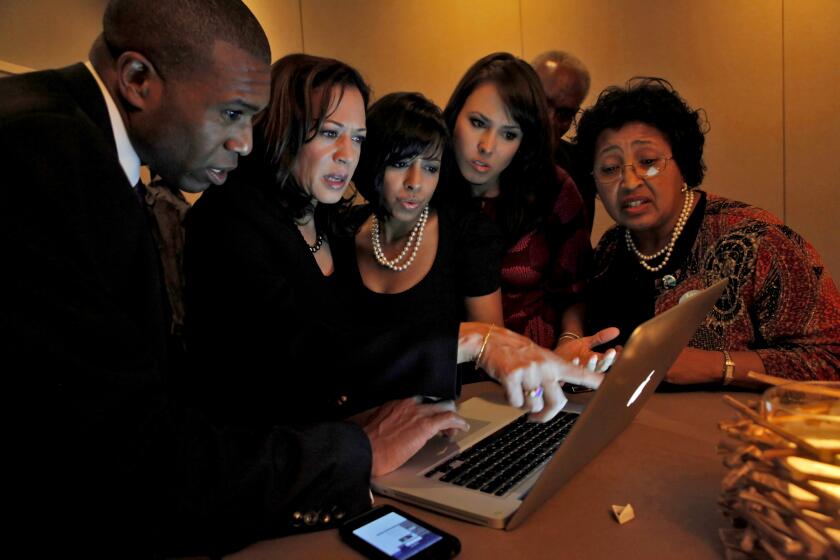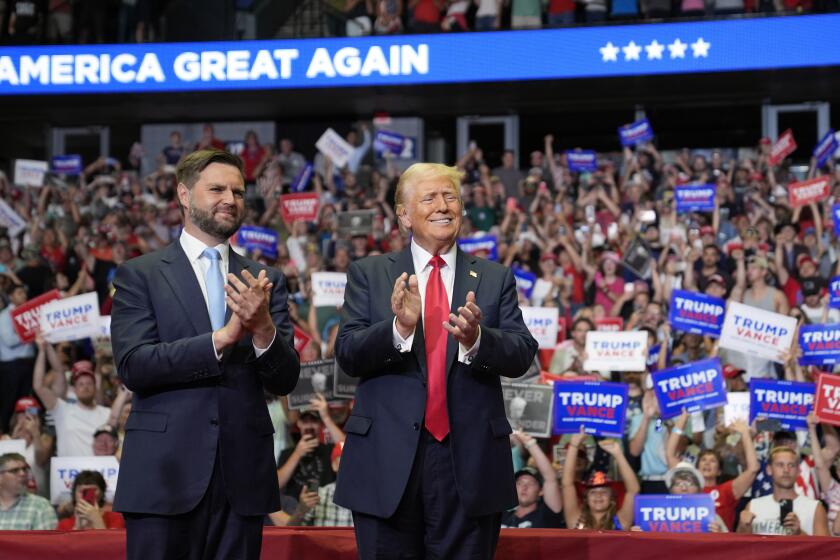Op-Ed: Ralph Nader: There’s no such thing as a political ‘spoiler’

The season for political exclusivity is upon us. Cries for Bernie Sanders to drop out for the benefit of the establishment Democrats’ nominee — Hillary Clinton — are rapidly increasing. In the close states, those same Democrats soon will be telling the Green Party and its probable nominee — Jill Stein — to get lost, calling a vote for Stein a vote for Donald Trump. Their counterpart Republicans will be giving the Libertarian Party and its nominee, Gary Johnson, former governor of New Mexico, similar treatment.
In this season, the politically bigoted word on everyone’s lips is “spoiler,” which is rather bold if you pause to consider that the two-party tyranny is spoiled to the core and not just with quid pro quo campaign contributions. The name-callers do not expect to be charged with being anti-choice. Don’t we know that “no candidate is perfect,” and surely we’ve seen how bad the other party’s candidate is? Don’t we know that politics is all about pragmatism, and only one of the two major party nominees can win? This is no time, they say, for voters to let their moral compasses guide them.
I reject this logic. The least-worst choices are getting worse every four years, and the insiders only exacerbate the problem by trying to defang the third-party competition. So long as there’s no robust challenge to the duopoly, there’s no reason for insiders to improve. Pragmatism is just another name for electoral extortion.
Besides, all candidates on the ballot try to get votes from one another. Either they are all spoilers, or none of them is. Arrogantly applying that word only to minor party candidates is to treat them as second-class citizens and set them up as scapegoats in close elections. Candidates running for public office on third-party or independent tickets are exercising their 1st Amendment rights: freedom of speech, assembly and petition. Insiders may oppose them but should not demand that they shut up. Their right to run and express themselves is equal to that of Democrats and Republicans.
Most voters support this view. Polls show a consistently low approval rating for the two parties and for members of Congress. Nearly 60%, according to many surveys, want a viable third party. And yet the voters often swallow the argument that they have no choice because they understand that the fix is in.
Let’s examine how the duopolists try to keep so-called spoilers out of competition.
Starting at the beginning of the process: They’ve enacted state laws that make it exceedingly difficult for outsiders to even get on the ballot. In California, would-be third-party candidates must submit valid signatures of at least 1% of registered voters (roughly 177,000) 88 days prior to an election. But that’s just the technical requirement; practically speaking, it’s necessary to submit roughly twice that because state officials jettison so many names.
If an outsider does manage to get on the ballot, he or she can expect to face a legal challenge. Indeed, Democrats and Republicans have filed many frivolous lawsuits, often before selected partisan judges, to get third-party candidates off the ballot. Regardless of whether these suits succeed, they inevitably drain time and resources.
Third parties led the way in the abolition of slavery, the women’s suffrage movements and protections for farmers, workers and consumers.
The next impediment is the debate stage. In 1987, the two major parties created a commercially funded private corporation, called the Commission on Presidential Debates, which keeps away competition by setting a nearly impossible barrier to entry: at least 15% in the national polls.
Despite the odds, minor party candidates sometimes attract significant, dedicated followings — but this means nothing on election day because we have a winner-take-all system. A candidate who loses with 10% or even 49% of the vote gets nothing. (Because of the Electoral College, it’s even possible to win the most popular votes in the country and lose, as happened in 2000.)
In some European countries, once beyond a minimum threshold (5% in Germany), the parties receive a proportional number of members of parliament reflecting the percentage of their vote. They are given a chance to grow in subsequent elections. Not in the USA. Our electoral system is designed to perpetuate the established powers. The ultimate absurdity is gerrymandering, where the politicians pick the voters and turn electoral districts into one-party domains, stripping voters of even a binary choice.
We seem to have forgotten that third parties have historically served a vital purpose. In the 19th and early 20th centuries, for example, third parties led the way in the abolition of slavery, the women’s suffrage movements and protections for farmers, workers and consumers. These parties did not go on to win national elections, but they didn’t “spoil” anything — they introduced many reforms that eventually entered the mainstream.
What would happen if small business was not allowed to compete? Economic stagnation from the absence of better goods and services. Because small parties cannot compete, we’re witnessing ideological and political stagnation.
But we can’t lay the blame entirely at political insiders’ feet. Voters don’t just need additional choices, they need to be more open to possibilities, less prejudicial to offbeat candidates; there is no substitute for informed voter engagement. People, often young ones, regularly come up to me at lectures and say that they enjoyed what I had to say but they’re just not turned on to politics. I respond by asking them to consider that, historically, such an attitude has allowed politics to turn on the people.
Ralph Nader, a four-time candidate for president of the United States, is the author of “Unstoppable: The Emerging Left-Right Alliance to Dismantle the Corporate State.”
Follow the Opinion section on Twitter @latimesopinion and Facebook
More to Read
A cure for the common opinion
Get thought-provoking perspectives with our weekly newsletter.
You may occasionally receive promotional content from the Los Angeles Times.






